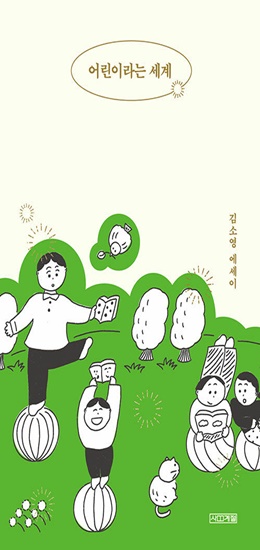|
Recently, various issues related to children, including the ‘No Kids Zone’ issue, have become hot topics. It is good that social discussion about children take place, but there are also people who are not happy about it. For this purpose, the book I want to recommend is The World of Children. This book is about the world observed from a child’s point of view, by a fairy tale book editor and a writer who run a reading class for children.
 |
First of all, standardize the loneliest child
In this book, there are several chapters that throw some ideas at readers through various anecdotes of writers related to children. Among them, the first thing I want to introduce is the story of the TV program ‘Superman is Back’ with the theme of childcare.
The author points out that the houses of celebrities in ‘Superman is Back’ are too spacious and luxurious. The house in the program is not a set, but a house where actual children live. Some children watch the show and pass it over casually, but for some children, the house may look unfamiliar as if it were in a dream. No one probably wants to see children who should otherwise enjoy watching TV feel lost and relatively deprived because of this disparity.
This is not the only problem with this TV show. The mixed-race children in ‘Superman is Back’ are all white-race children, including Park Joo-ho's children, Sam Hammington's two sons, and Fujita Sayuri's son. None of the children appearing on the show have been Southeast Asian, the Middle Eastern, or Black. This is not only true for 'Superman is Back’. There are not many of these mixed-race celebrities in the entire Korean entertainment industry on the whole. This is because those who are mixed-race do not receive attention from the Korean public beyond those who fit a white-centered aesthetic ideal. However, outside of TV, children of various races are living in the world. Broadcasters that value diversity and embrace should strive to create programs that children of various classes and races can enjoy.
Some lonely children learn about the world through TV and encounter their peers only through TV. The author says that if there is a program that children can watch, it should be created "based on the loneliest children" so that such children do not feel sad and alienated. The scenery that lonely children should see on TV is not a fancy apartment with a spacious living room and four rooms. It is necessary for children to see various families naturally play and enjoy themselves together, and sincere and nice people doing favors to the world.
Something that requires courage and tolerance
The second is about the so-called, ‘No Kids Zone’. The author emphasizes the injustice of the no-kids zone in the attitude of 'reverse position'. Just as there are children who cry and scream in restaurants or cafes and cause inconvenience to customers, there are also many adult customers who make the other frown for similar reasons. However, if a business owner selects only "young people," "quiet women," and "clean men" as customers, the store may be criticized by the public and quickly shut down its business. It would be a problem when it comes to adults, but why is discrimination against children naturally accepted? I think this problem arises because adults do not view children as a single person but as merely a belonging to their parents. People consume the images of cute children on TV programs, and at the same time, they only hope that the children will behave calmly and cutely who like them. However, it is close to impossible to control children in reality.
If we look back on the history of mankind, people have excluded others according to gender, race, disability, and the gap between rich and the poor. And now, it’s the children’s turn. Children who have not experienced tolerance cannot grow up to be tolerant adults. Children who have learned that they can be left out of society will exclude someone else as they have experienced. When children become adults like us, there may be a ‘no-elderly zone’ in the world. However, if we treat children as equal members of society, children will grow up to be adults who are wary of discrimination and respect others as human beings.
We were all children once. We ran around, screamed in public places, and we were often out of control even if adults scolded us. However, there were no places we could not go with our parents. We were able to learn the manners to follow in public places while traveling around with adults. But what about now? Aren’t we depriving children of their opportunities for our convenience?
We all grew up thinking hard about which hand is the right hand and how to tie our shoelaces well. However, experiencing childhood does not mean that we can understand their minds well. In order to re-enter the world of children as an adult, you must see the world according to the height of the child, run, walk, and think according to the child's stride. The most important thing to do so is to look into the child with an open mind, 'I was like that when I was young.' Then, we can realize that the images of children we were so tired of and discourteous were actually ours. I hope many people will read this book, understand the ‘world of children’, and remain good adults who are warm to children. < Copyright © The Gachon Herald All rights reserved > |
